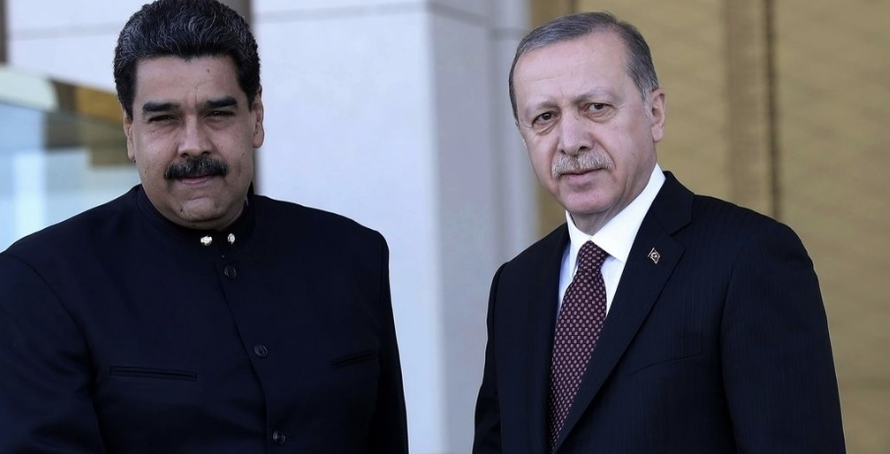Venezuelan Dictator Nicolas Maduro sold off some 40% of Venezuela’s gold reserves last year as he struggled to keep his floundering government afloat, according to Bloomberg.
But with the noose of US sanctions growing ever tighter, Maduro struggled to find buyers. Which is where a mysterious Turkish gold broker came into play.
In a report published Friday, Bloomberg revealed the role played by Sardes, a Turkish gold broker with just $1 million in assets, which sprang into existence shortly after Maduro visited Recep Tayyip Erdogan. Founded in January 2018, Sardes quickly saw the volume of gold it was handling explode. Shortly after it opened for business, Sardes imported $41 million of Venezuelan gold – the first such transaction involving Turkey and Venezuela in more than 50 years. The following month, it imported $100 million more.
By the time President Trump signed an order approving sanctions on the Venezuelan gold trade in November, Sardes had imported a total of $900 million of gold from the vaults of the failing socialist nation’s central bank. That amounts to about 24 tons of gold.
About 24 tons of the gold was sold to Istanbul’s Sardes Kiymetli Madenler SA, according to Paparoni. The company got regulatory approval to operate as a member of Borsa Istanbul’s Precious Metals Market on Dec. 26, 2017, just days after signing its first contract with Venezuela’s central bank, according to documents obtained by Bloomberg. A company official declined to comment.
And in a sign that the Venezuela crisis could lead to renewed tensions between the US and Turkey, BBG pointed out that this isn’t the first time this has happened. It’s also the latest sign that Turkey under Erdogan has unequivocally sided with China and Russia in opposing US interests…
It’s not the first time that Turkey has positioned itself as a work-around for countries facing U.S. sanctions, potentially undermining Washington’s efforts to isolate governments it considers hostile or corrupt. Ankara has often tested the boundaries of U.S. tolerance, and the alliance between the key NATO members is now essentially broken, according to two senior U.S. officials.
…Because aside from a general resistance to US meddling in the foreign affairs of other countries (likely rooted in the US’s support for the Kurds), it’s not exactly clear what Erdogan has to gain by aiding Maduro. Venezuela doesn’t even rank among the top 20 trading partners for Turkey (whose economy is reliant on foreign capital and is also a net energy importer).
Erdogan traveled to Caracas in December to introduce the Venezuelan leader to Ahmet Ahlatci, chairman of one of Turkey’s largest gold refiners. The next month, Maduro’s close ally Tareck El Aissami reciprocated with a visit to an Ahlatci refiner in the central Turkish city of Corum. Turkey’s pro-government media reported that Venezuelan gold would be processed there.
That never materialized because Ahlatci was wary of falling foul of U.S. sanctions, according to a person with direct knowledge of the visit. Instead, El Aissami surveyed refining technology to try and replicate it back home, the person said, asking not to be identified because of the sensitivity of the matter.
And there are also signs that Erdogan has been taking a more direct role in helping Venezuela circumvent US sanctions via the gold trade…
Erdogan traveled to Caracas in December to introduce the Venezuelan leader to Ahmet Ahlatci, chairman of one of Turkey’s largest gold refiners. The next month, Maduro’s close ally Tareck El Aissami reciprocated with a visit to an Ahlatci refiner in the central Turkish city of Corum. Turkey’s pro-government media reported that Venezuelan gold would be processed there.
That never materialized because Ahlatci was wary of falling foul of U.S. sanctions, according to a person with direct knowledge of the visit. Instead, El Aissami surveyed refining technology to try and replicate it back home, the person said, asking not to be identified because of the sensitivity of the matter.
…Which resembles, in some ways, the same gold payment schemes that Turkey uses to pay Iran for its imports of Iranian oil.
Under the sanctions regime, Iran sells billions of dollars of fuel to Turkey every year, but then finds most of its money trapped in Turkish bankaccounts because of international restrictions on wiring the money back to Tehran. Elaborate schemes entailing the use of physical gold have in the past allowed the Islamic Republic to finance its foreign trade.
Mehmet Hakan Atilla, the former head of international banking at Turkish state-owned lender Turkiye Halk Bankasi AS, was convicted last year in a New York court of participation in such a scheme. Turkey says the case relied on fabricated evidence and denies wrongdoing. It also says it’s not obliged to abide by unilateral U.S. sanctions that block its ability to trade with neighbors and other economic partners.
Official data make it impossible to know where the Venezuelan gold ended up after it landed in Turkey. The Turkish government did not disclose the whereabouts of the gold.
But maybe – just maybe – if the US agrees to deport Fethullah Gulen, Erdogan might reconsider the terms of his relationship with Maduro.
via ZeroHedge News http://bit.ly/2SiTFDS Tyler Durden
